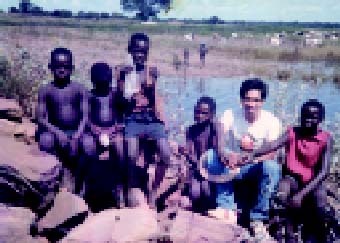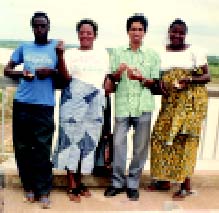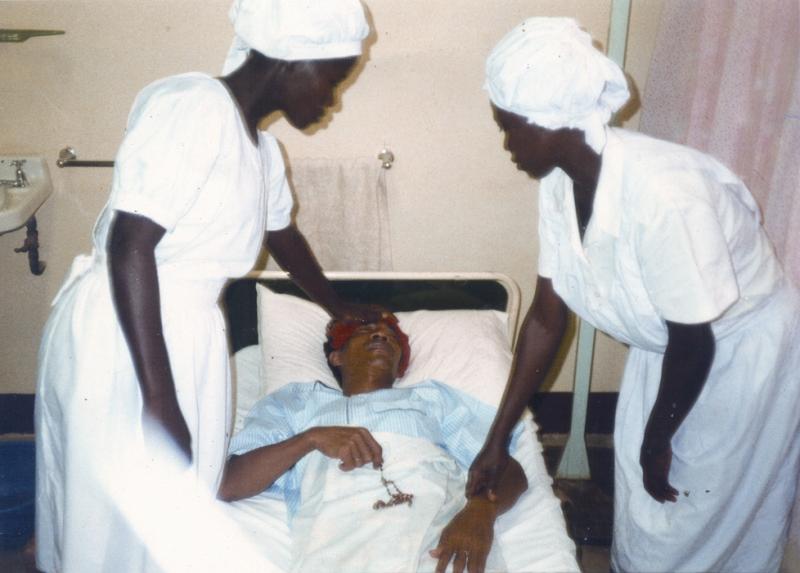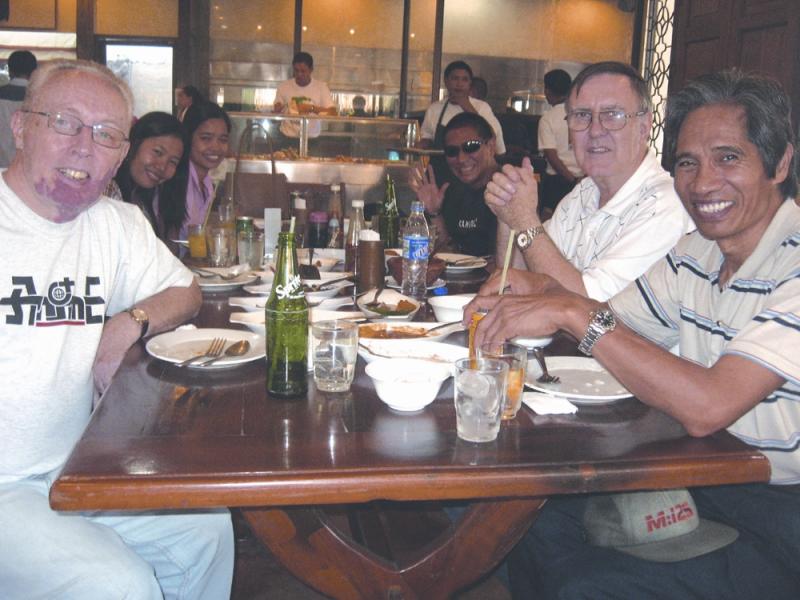In Rainbow Colors
By Mitzi Ramos
Who knew that a letter of appreciation would be the beginning of eighteen years ' heavenly humor from the mission front to the lap of urban readers? This is exactly how the experiences of an isloated Ghanaian missionary found their way into the pages of Misyon. It is my pleasure to introduce the real Father Joeker. From Joseph Panabang SVD.

Cream of the crop
After finishing his elementary education he naturally first entered the CICM seminary. After a time he left the seminary to study at St Louis University in Baguio City. He finished his degree in BSN Sociology in 1978, working while studying. He strove to remain at the top of his batch for a fifty percent scholarship. He made his way to the SVD seminary in response to the unceasing call to the priesthood. During his regency (time spent by the seminarian outside the seminary to take a rest or to explore the realities of `real' life), Father Joe taught at the Divine Word College of Laoag. Despite his being a favorite among the ladies, he confessed to having no interest in pursuing any of them. The call still resounded in his heart, so back to the seminary he went and to his eventual ordination in 1986.
Free to soar
Nearing his ordination, he relates how easy it was for him to fill out the form that asked how he wished to allocate his worldly possessions. Being the youngest of twelve he had no worldly possessions to apportion to relatives and friends. He felt freedom and joy in that realization especially when his family signed the document that declared he no longer had any obligation nor ties to them. He, from the moment of ordination, belonged to God and His people.
Gaang to Ghana

Fr Joe's color
Red passion is what colors Father Joe's efforts to be one with the Ghanaian people. When he first arrived, he gamely walked with them to get to the next town. They are used to walking the whole way, even as far as ten kilometers, without stopping to rest! Father Joe walked with them at night to avoid the extreme heat during the day. After a while, he introduced the concept of stopping to rest along the way. He created resting spots which later on came to be known as osofo _ the `priest's resting place' which the people have since then learned to use as well. Passion enables Father Joe to persevere when he undertakes tasks which at first seem quite foolish to the people around, like his idea of developing an ecumenical prayer place around a waterfall. When he was building the place, he had a lot of critics standing around watching him. Yet these same people now use the prayer place for their own leisure and activities.
The bright side of life
Father Joe's ability to find the brighter side to most situations stems from his belief that the more you defend yourself, the more energy you use, but once you use humor . . . you free yourself from unnecessary tension. His good spirits are also bolstered by the joy he finds in serving. Contentment is his when he focuses on simple things like lying down at the back of his car at night on his way to distant villages. With a mosquito net to cover the opening, and the wide expanse of the night sky right overhead, Father Joe finds sleep quickly.
No harm in asking
His positive spirit, sunny disposition and serenity are rooted in the experience of having learned a few things about life along the way. First, he has learned to always ask questions. There is no shame in not knowing something especially when dealing with a different culture. For example, the Ghanaians consider it an insult if you talk to animals in their presence. They believe that you are actually talking about them or making a snide comment regarding them. Father Joe had to explain from the pulpit that speaking to animals is not done to insult any Ghanaians within hearing but is a way of showing affection to our pets. He wouldn't have known about this cultural trait if he hadn't asked.
God's words, not his
Second, there is a proper time for a certain learning to take place. One cannot force another person to learn when he is not ready for it. He is of the conviction that it's not always about you. He has had numerous experiences of giving homilies wherein the parts which he felt had no impact were actually the portions people would thank him for later. From these moments he has come to recognize that he is not the only one at work in the mission fields. He sees that God is in control and that he need not be proud of `his' work or stressed when things don't go the way he had planned. He has learned to accept that he cannot understand everything at once and that it's actually okay.
Lastly, Father Joe asks the question, `Masaya ka ba? (Are you happy?)'. Your answer indicates whether you are doing what you were made for. Everyone wants to be happy. If one is not happy, it will manifest itself somehow. This
`measurement' can be applied to the question of vocation. For Father Joe, the religious life is where he is happiest. If a person is really called and tries to ignore it, the end result is always misery. The same is true for those who insist that they have a vocation to the religious life thinking it is the noblest way to love God yet they know that they are called to a different vocation. Again, for him, you cannot force something you were not made for. He considers the religious life as a reminder to others that there is another way of loving God and that this particular way should not bring you fear. A love for your vocation will result in a happy person _ happy priest, nun, brother, single or married person. This same love helps when dealing with the difficulties inherent in the vocation you have chosen. Quoting Father Joe, `If you do not appreciate your vocation, it is a warning sign. . . .'
Incurable sickness

Father Joe has allowed his mission post, its people, with their everyday struggles and triumphs, to affect him, to make a place for themselves in his heart, right alongside the place where his native village resides. `When God takes you away, God will also send someone to take care of those whom you leave behind', was his reflection upon his first visit home to Gaang. He almost cried when he saw that his own village had been neglected in terms of the people receiving the sacraments like Baptism, Anointing of the Sick, Marriage, Reconciliation and the Holy Eucharist. In contrast to how he took great pains to ensure that during his absence the people in his Ghanaian parish would be able to avail of these life-giving sacraments, his own people had not received a visit from a priest of the diocese for years. At first he felt guilt in leaving his own people behind to bring the Good News to the people of a foreign land yet, as the bishop of his diocese reassured him, God will send a replacement. True enough, a few years after, on his next home visit, Father Joe saw that God had sent someone to care for his own village. This convinced him that there is no need to worry for God takes care of ALL his people. Lessons from Father Joeker
Though we know Father Joe more as Father Joeker and his quips have brought smiles and even laughter for the past eighteen years, he is far from being shallow. In contrast, his joy is one that is constant for it stems from seeing, recognizing and rejoicing in the presence of God in everything and in everyone.
Feasting with Fr Joe, Fr John O' Mahony SVD
Fr Sean Coyle and Misyon Staff
Trying to put Father Joe into words is like trying to hold a rainbow in one's hands. He is made up of so many facets, one as colorful as the next. He is the red of passion for his vocation, the orange of a positive spirit, the yellow of a sunny disposition, the green of a hopeful outlook towards circumstances, the blue of a serene trust in God's greater design, the indigo of a compassionate heart, and the violet of shared sorrow with the people he comes from, his native Kalinga, and the people he has chosen to walk with, the Ghanaians.
